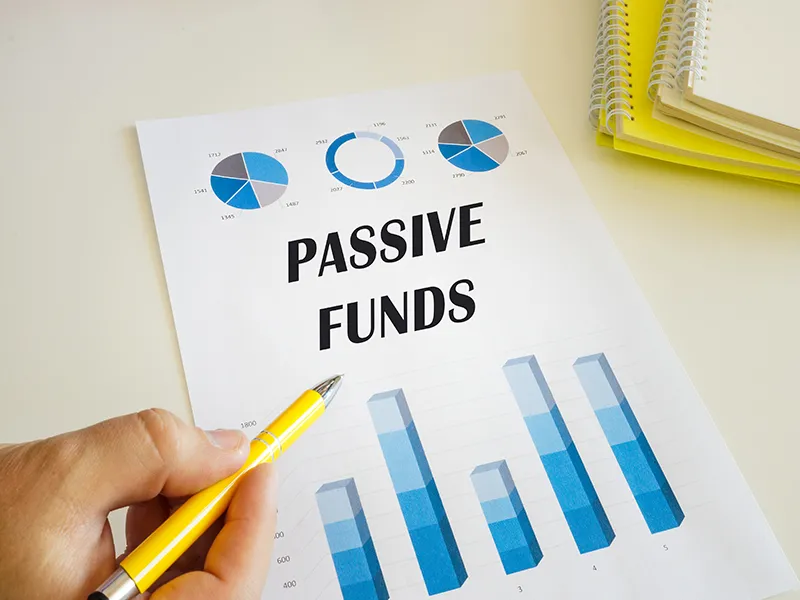
As equity investments gain popularity among Indian investors, equity mutual funds are one of the most sought-after investment options, especially among long-term investors. Mutual funds are also seeing the advent of newer alternatives, such as index funds. These passively managed funds were mostly popular in the western markets up until recently but have made their way into the Indian investment market since the past couple of years.
Here, we will discuss passive funds and some of the factors to consider while investing in them.
What are passive funds?
As opposed to actively managed mutual funds, passive funds do not actively pick investments such as stocks, bonds, etc for the fund. They instead replicate the composition and performance of indices, such as Sensex and Nifty.
Take, for example, index funds. These are a simple and effective medium for long-term investment, especially for new investors. Passive funds also come with lower costs as compared to traditional funds and are therefore beneficial for investors.
As passive funds such as index funds and ETFs gain popularity among Indian investors, it is the right time to know how to pick a suitable passive fund for investment. Although there are limited passive fund options available in the Indian markets, investors should know the factors associated with these funds that can influence their investment returns.
Important factors to consider while choosing a passive fund
Here are some of the factors to keep in mind while choosing the right passive fund for investment:
a. Take note of possible pricing inefficiency in ETFs
ETFs, as the name suggests, are traded on an exchange and therefore their price is often dynamic. ETFs track the prices of stocks that are part of the benchmark index. There may be a price difference between the NAV of the ETF and the market price of the ETF due to demand and supply. So, you should verify the right price before buying these on the exchanges.
b. Tracking error
Tracking error is the difference between the index returns and the fund returns. While a passive fund such as an index fund or ETF aims to track a benchmark index performance, it’s nearly impossible to exactly track or replicate the benchmark’s performance. Investors should keep away from funds that have comparatively higher tracking errors. If two funds have the same tracking errors, it makes sense to go with the fund house that carries more experience and offers more products.
c. Expense ratio
Index funds are popular among investors since they are cheaper than regular mutual funds. In the long run, lower the expense ratio of an index fund, the lower will be its tracking error. However, investors must avoid investing in an index fund only because it’s cheaper. It is important to consider the fund’s track record in combination with its expense ratio.
d. Right scheme for your risk profile
Before selecting a passive fund, investors must carefully consider their risk profile. Passive investments are now available not only for investing in broad based indices like the Nifty 50 or the Sensex, but a plethora of other funds are available for other indices such as Small Cap/mid cap or a sectoral index like consumption/infrastructure/banking, etc.. Further, smart beta funds invest in chosen stocks from an index based on factors like volume, volatility, etc.
While investing in broad based indices may hold good for many investors, some others may not be able to handle the volatility of midcap or small cap index funds/ETFs. Or they may not understand the working of a smart beta fund. Investors should consider their comfort with the format and risk of each before picking one. Market experts often observe that investors do not lose their capital due to a bad performing investment, but when they invest in an avenue that doesn’t suit their risk appetite.
Conclusion
New investors who wish to participate in the India growth story can consider investing in long-term equities and what better way to start than index funds. Index fund investment is the easiest way to invest in equities due to their simplicity and low cost. A good mix of active and passive funds within a portfolio can go a long way in long-term capital appreciation.
FAQs
A focused index fund is a passive mutual fund which invests in a relatively small number of securities that are identical in some manner. These allow investors an opportunity to fetch capital appreciation through sectoral focus.
Passive investing is preferable for long-term investment benefits combined with lower cost of investment. Active investing is ideal for those who prefer to invest for the short to medium duration and have a higher risk appetite.
While choosing the right index fund for passive investment, one can look at the brand standing of the fund house, historical performance, expense ratio, and tracking error of the scheme.
A fund with an expense ratio in line with industry standards is acceptable. Since passive investment is mainly to save on cost, the lower the expense ratio, the better for investors.
A tracking error tells an investor how much a fund’s performance has deviated from the benchmark index performance.



























